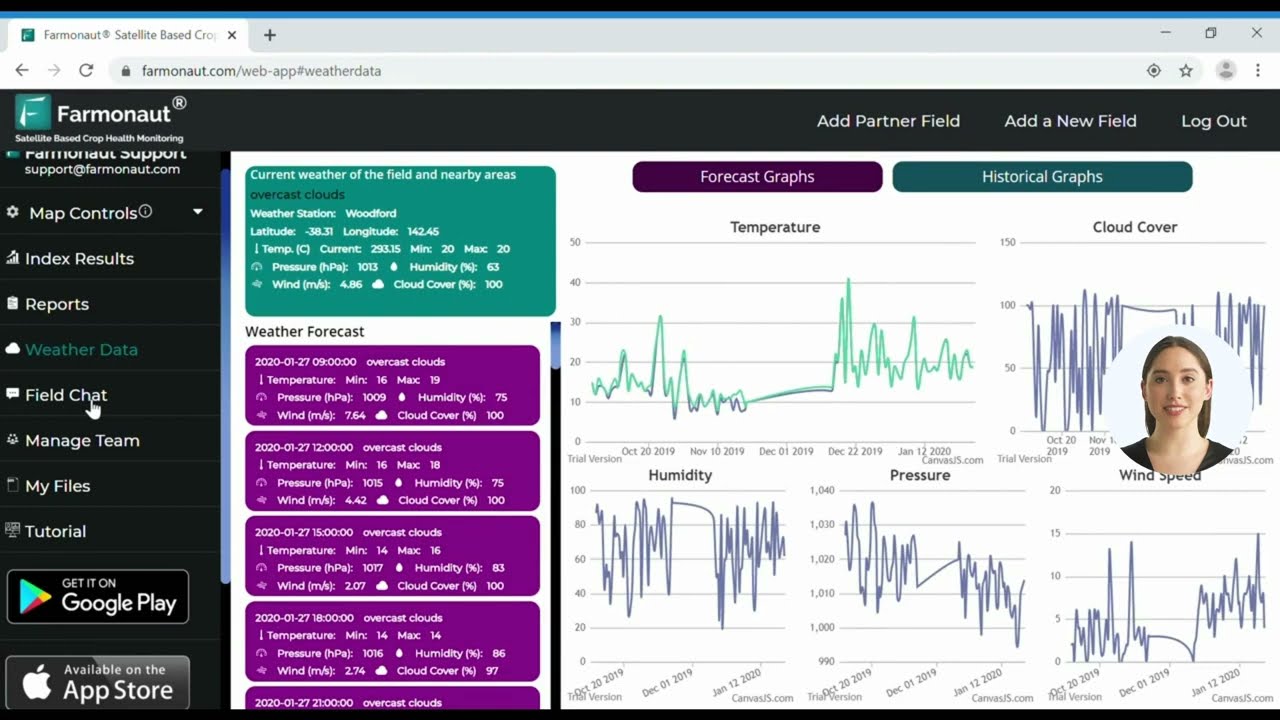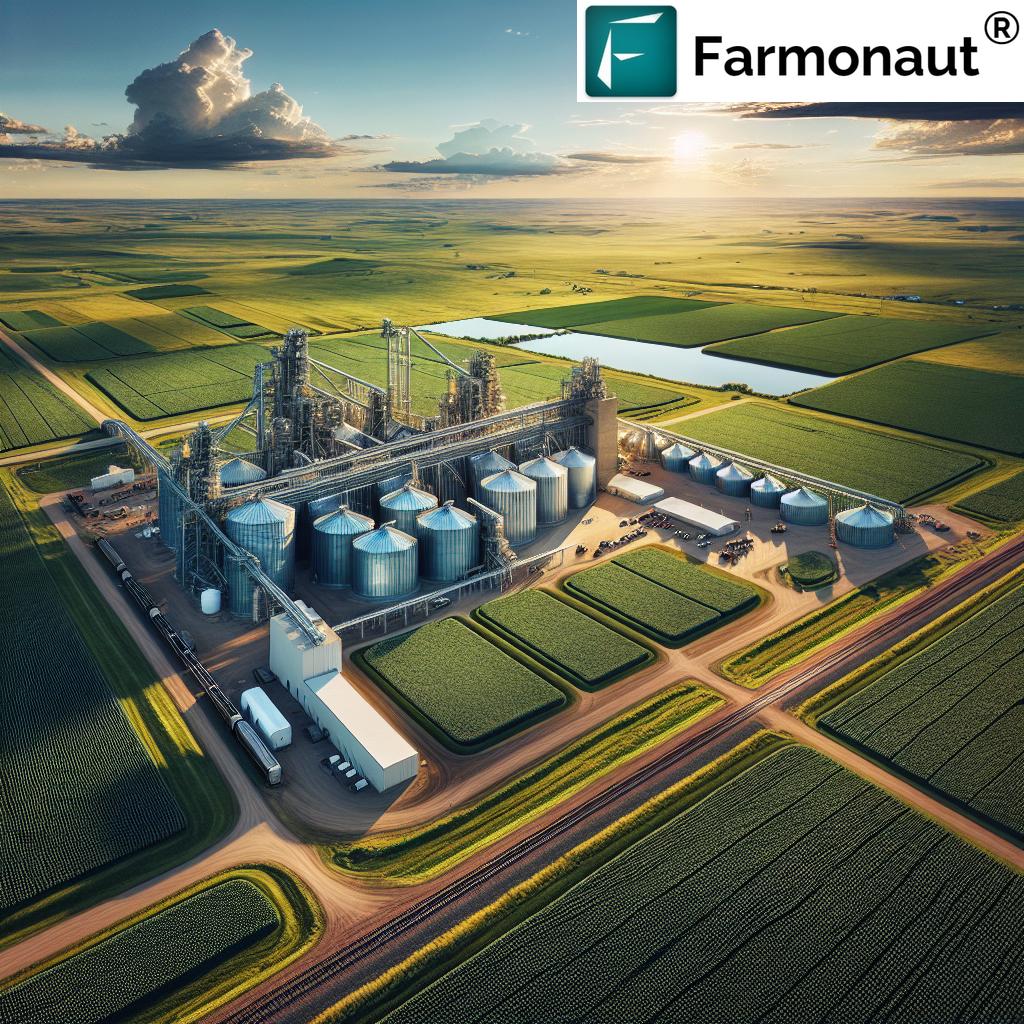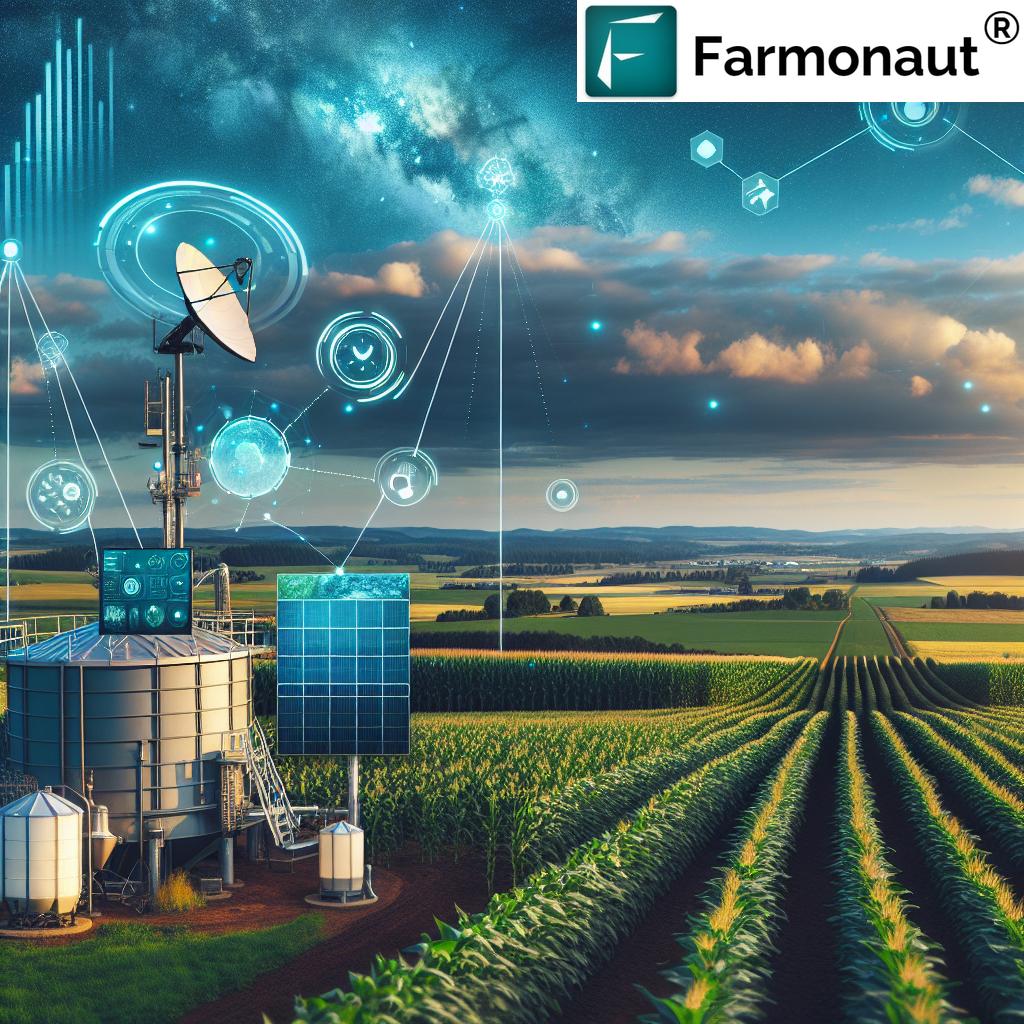Revolutionizing Iowa Farms: How Electric Tractors and Precision Agriculture Are Shaping the Future of Sustainable Farming
In the heartland of America, a quiet revolution is taking place across the sprawling fields of Iowa. The traditional image of farming is being transformed by cutting-edge technologies, sustainable practices, and innovative machinery. At the forefront of this agricultural renaissance are electric tractors and precision agriculture systems, reshaping the way we think about farming for the future. In this comprehensive exploration, we’ll delve into how these advancements are not only changing the face of Iowa farms but also setting a precedent for sustainable agriculture worldwide.
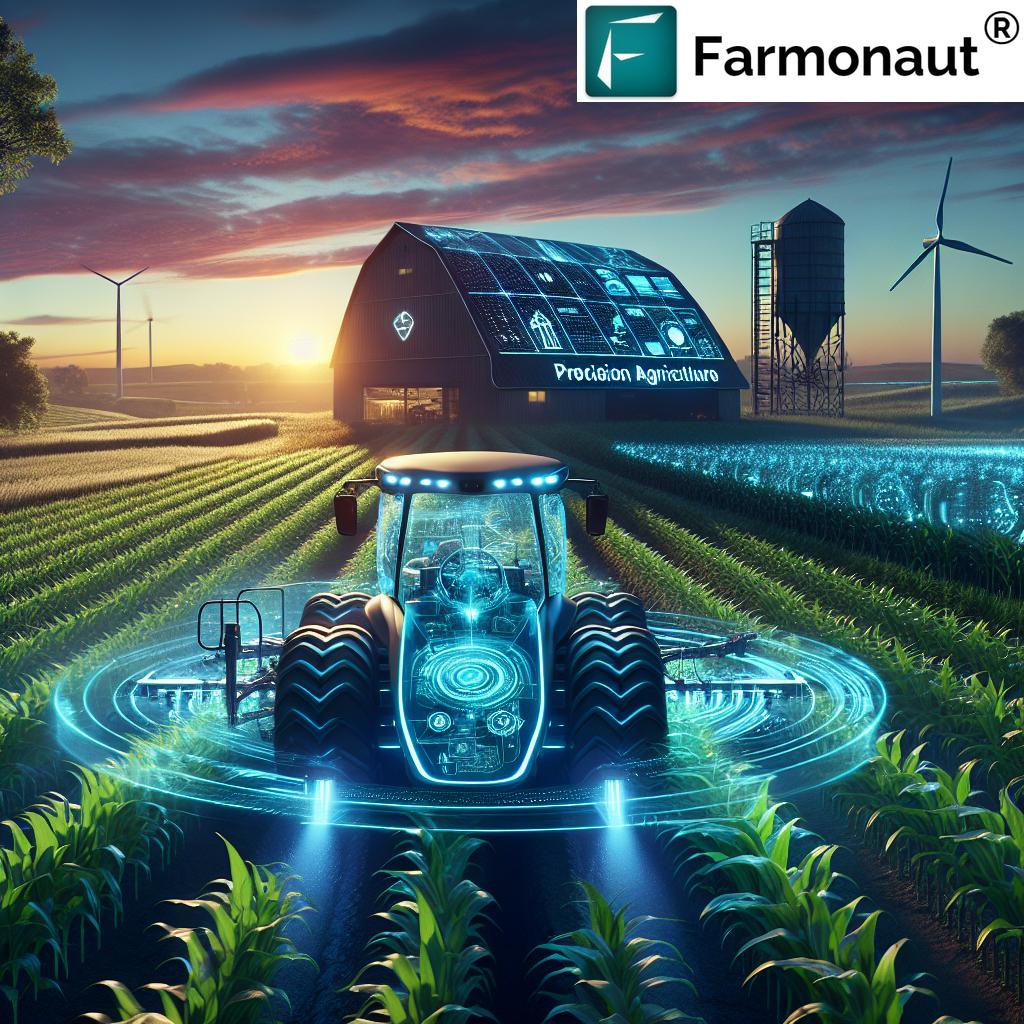
“Electric tractors can reduce farm operating costs by up to 50% compared to traditional diesel-powered models.”
The Rise of Electric Tractors in Iowa
As we witness the dawn of a new era in agriculture, electric tractors are emerging as game-changers in the industry. These sustainable agricultural machinery options are not just a futuristic concept but a present reality for many Iowa farmers. Let’s explore how these electric powerhouses are revolutionizing farm operations:
- Reduced Operational Costs: Electric tractors significantly cut down on fuel expenses, a major concern for farmers facing fluctuating fuel prices.
- Lower Maintenance Requirements: With fewer moving parts, electric tractors require less frequent servicing, saving time and money.
- Environmental Benefits: Zero emissions contribute to cleaner air and reduced carbon footprint, aligning with sustainable farming practices.
- Quiet Operation: Electric motors produce less noise, creating a more pleasant working environment and reducing noise pollution in rural areas.
The adoption of electric tractors for farming is gaining momentum, with major manufacturers investing heavily in this technology. As battery technology improves and charging infrastructure expands across Iowa, we’re seeing a surge in demand for these eco-friendly machines.
Precision Agriculture: The Digital Revolution in Farming
Alongside the rise of electric tractors, precision agriculture is transforming how Iowa farmers manage their crops and resources. This technology-driven approach uses data to make informed decisions, optimize yields, and reduce waste. Here’s how precision agriculture software and tools are making a difference:
- Satellite Imaging: Advanced satellite technology provides real-time crop health monitoring, allowing farmers to identify issues before they become problematic.
- GPS-Guided Systems: Tractors equipped with GPS can plant, spray, and harvest with centimeter-level accuracy, maximizing efficiency and minimizing overlap.
- Soil Sensors: In-ground sensors provide detailed information about soil moisture, temperature, and nutrient levels, enabling precise irrigation and fertilization.
- Drone Technology: Drones offer aerial views and can apply treatments to specific areas, reducing the need for blanket applications of pesticides or fertilizers.
At Farmonaut, we’re proud to be at the forefront of this agricultural technology trend. Our satellite-based farm management solutions provide Iowa farmers with invaluable insights into their operations, helping them make data-driven decisions that boost productivity and sustainability.
The Synergy of Electric Tractors and Precision Agriculture
The combination of electric tractors and precision agriculture creates a powerful synergy that’s revolutionizing Iowa farms. This partnership between sustainable machinery and smart technology is driving the future of farming in several ways:
- Integrated Systems: Electric tractors are often equipped with advanced computer systems that seamlessly integrate with precision agriculture software, creating a cohesive farm management ecosystem.
- Data-Driven Efficiency: The precise control offered by electric motors allows for more accurate implementation of data-driven insights from precision agriculture tools.
- Resource Optimization: Together, these technologies enable farmers to use resources like water, fertilizer, and energy more efficiently, reducing waste and environmental impact.
- Automated Operations: Many electric tractors feature autonomous capabilities, which, when combined with precision agriculture data, can perform tasks with minimal human intervention.
This technological convergence is not just improving farm productivity; it’s also attracting a new generation of tech-savvy farmers to the industry, ensuring the continuity of Iowa’s rich agricultural heritage.
The Impact on Iowa’s Agricultural Landscape
The adoption of electric tractors and precision agriculture is having a profound impact on Iowa’s farming community and economy:
- Increased Productivity: Farmers are seeing higher yields and better crop quality, boosting their competitiveness in the global market.
- Environmental Stewardship: Reduced emissions and more efficient resource use are helping Iowa farms become more environmentally sustainable.
- Economic Benefits: While initial investment in new technology can be high, the long-term savings and increased productivity are improving farm profitability.
- Job Creation: The influx of technology is creating new job opportunities in agricultural technology, data analysis, and equipment maintenance.
These changes are not just benefiting individual farmers; they’re strengthening Iowa’s position as a leader in agricultural innovation and sustainability.
Challenges and Considerations
While the benefits of electric tractors and precision agriculture are clear, there are challenges that Iowa farmers must navigate:
- Initial Costs: The upfront investment for electric tractors and precision agriculture systems can be substantial.
- Infrastructure Needs: Charging stations for electric tractors and reliable internet connectivity for data transmission are essential but not always readily available in rural areas.
- Learning Curve: Adopting new technologies requires training and education, which can be time-consuming for busy farmers.
- Data Privacy: With the increase in data collection, ensuring the security and privacy of farm data is crucial.
Despite these challenges, the long-term benefits and the support from agricultural technology companies like Farmonaut are helping farmers overcome these hurdles.
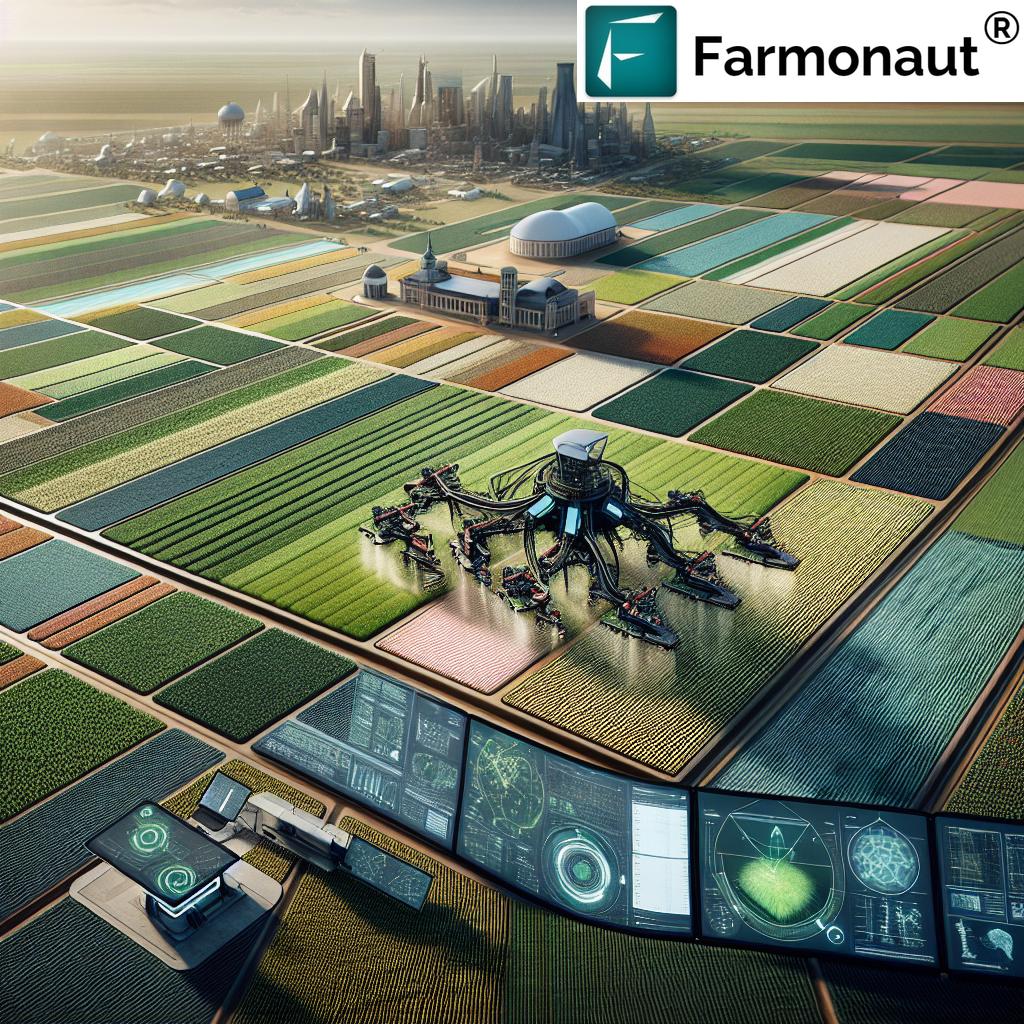
“Precision agriculture technologies can increase crop yields by 10-15% while reducing water usage by up to 30%.”
The Role of Farmonaut in Iowa’s Agricultural Revolution
At Farmonaut, we’re committed to supporting Iowa farmers in their transition to more sustainable and efficient farming practices. Our satellite-based crop monitoring and AI-driven advisory systems provide valuable insights that complement the use of electric tractors and other precision agriculture tools. Here’s how we’re contributing to the revolution:
- Real-Time Crop Health Monitoring: Our satellite imagery allows farmers to track crop health and identify issues quickly, enabling timely interventions.
- Weather Forecasting: Accurate weather predictions help farmers plan their operations more effectively, especially when using electric tractors with weather-dependent charging needs.
- Resource Management: Our tools help optimize the use of water, fertilizers, and other inputs, aligning perfectly with the efficiency goals of electric tractor users.
- Data Integration: Farmonaut’s platform can integrate with various farm management systems, creating a comprehensive digital ecosystem for modern farms.
By leveraging our technology, Iowa farmers can make the most of their investment in electric tractors and precision agriculture systems, driving their operations towards a more sustainable and profitable future.
Explore Farmonaut’s API for advanced agricultural data integration
The Future of Farming in Iowa and Beyond
As we look to the future, the trends we’re seeing in Iowa are likely to spread across the country and around the world. The combination of electric tractors and precision agriculture is setting new standards for sustainable farming practices. Here’s what we can expect in the coming years:
- Increased Automation: Autonomous electric tractors guided by AI and precision agriculture data will become more common, further optimizing farm operations.
- Advanced Energy Solutions: We may see the integration of renewable energy sources like solar and wind power to charge electric farm equipment, creating truly sustainable farm ecosystems.
- Data-Driven Decision Making: As more farms adopt these technologies, the collective data will lead to better predictive models and farming practices across the industry.
- Evolving Farm Equipment Demand: The shift towards electric and smart machinery will reshape the agricultural equipment market, with new players and technologies emerging.
Iowa’s leadership in adopting these technologies positions the state as a model for agricultural innovation, influencing global farming practices and equipment manufacturing.
Comparative Analysis: Traditional vs. Electric Tractors in Iowa Farming
To better understand the impact of electric tractors on Iowa farms, let’s compare them with traditional diesel tractors:
| Feature | Traditional Diesel Tractor | Electric Tractor |
|---|---|---|
| Fuel Efficiency | Varies, subject to diesel prices | High efficiency, lower operational costs |
| Environmental Impact | High CO2 emissions | Zero direct emissions |
| Operational Costs | Higher due to fuel and maintenance | Lower, estimated 50% reduction |
| Maintenance Requirements | Regular oil changes, more moving parts | Fewer moving parts, less maintenance |
| Power Output | Consistent power delivery | Instant torque, potentially higher peak power |
| Integration with Precision Agriculture Systems | Moderate compatibility | High compatibility, advanced computer systems |
This comparison highlights the significant advantages that electric tractors offer to Iowa farmers, particularly in terms of operational costs, environmental impact, and integration with modern farming technologies.
The Role of Policy and Incentives
The transition to electric tractors and precision agriculture in Iowa is not happening in isolation. It’s being supported and accelerated by various policy measures and incentive programs:
- Government Subsidies: Financial incentives for purchasing electric farm equipment are helping offset the initial investment costs.
- Research Funding: State and federal grants are supporting the development of new agricultural technologies and sustainable farming practices.
- Educational Programs: Initiatives to train farmers in new technologies are crucial for widespread adoption and effective use.
- Infrastructure Development: Public-private partnerships are working to improve rural internet connectivity and establish charging networks for electric vehicles.
These supportive policies are crucial in accelerating the adoption of sustainable agricultural machinery and practices across Iowa’s farming communities.
Check out our API Developer Docs for integrating advanced agricultural data into your systems
Global Implications of Iowa’s Agricultural Revolution
The changes happening in Iowa farms have implications that reach far beyond the state’s borders. As a major agricultural producer, Iowa’s adoption of electric tractors and precision agriculture is influencing global trends:
- Technology Transfer: Innovations tested and proven in Iowa are being adapted for use in other regions around the world.
- Market Influence: Iowa’s shift towards sustainable farming is affecting global agricultural markets and commodity prices.
- Environmental Leadership: The state’s efforts in reducing the environmental impact of farming are setting an example for other agricultural regions globally.
- Food Security: Increased efficiency and productivity in Iowa contribute to global food security efforts.
As Iowa farmers continue to embrace these technologies, they’re not just changing their own operations; they’re contributing to a global shift towards more sustainable and efficient agriculture.
The Economic Impact on Iowa’s Agricultural Sector
The adoption of electric tractors and precision agriculture is having a significant economic impact on Iowa’s agricultural sector:
- Job Creation: New roles in technology, data analysis, and equipment maintenance are emerging in the agricultural sector.
- Increased Farm Revenues: Higher yields and reduced operational costs are improving farm profitability.
- Investment Attraction: Iowa’s leadership in agricultural innovation is attracting investment from tech companies and venture capital firms.
- Export Opportunities: The expertise developed in Iowa is creating new export opportunities for agricultural technology and consulting services.
These economic benefits are strengthening Iowa’s agricultural sector and contributing to the state’s overall economic growth.
Overcoming Adoption Barriers
While the benefits of electric tractors and precision agriculture are clear, there are still barriers to widespread adoption. Here’s how these challenges are being addressed:
- Financial Support: Grants, low-interest loans, and leasing options are making new technologies more accessible to farmers.
- Education and Training: Extension services and agricultural colleges are offering programs to help farmers understand and implement new technologies.
- Infrastructure Development: Initiatives to improve rural broadband and establish charging networks are underway across the state.
- Collaborative Research: Partnerships between universities, tech companies, and farmers are driving innovation and practical solutions.
By addressing these barriers, Iowa is paving the way for broader adoption of these revolutionary farming technologies.
The Human Element: Farmers at the Center of Technological Change
While we focus on the technological aspects of this agricultural revolution, it’s crucial to remember that at the heart of these changes are the farmers themselves. The transition to electric tractors and precision agriculture is not just about adopting new tools; it’s about changing mindsets and practices that have been ingrained for generations. Here’s how Iowa farmers are navigating this change:
- Embracing Lifelong Learning: Farmers are becoming tech-savvy, attending workshops and webinars to stay updated on the latest agricultural innovations.
- Balancing Tradition and Innovation: Many are finding ways to integrate new technologies with time-tested farming wisdom passed down through generations.
- Community Collaboration: Farmer networks and cooperatives are sharing experiences and best practices, accelerating the learning curve for new technologies.
- Adapting to New Roles: As farms become more technologically advanced, farmers are evolving into data analysts and technology managers in addition to their traditional roles.
This human element is crucial in ensuring that the technological revolution in agriculture truly serves the needs of farmers and rural communities.
The Role of Data in Modern Farming
Data is the lifeblood of precision agriculture, and its importance cannot be overstated in the context of modern farming practices. Here’s how data is revolutionizing Iowa farms:
- Predictive Analytics: By analyzing historical data and current conditions, farmers can make more accurate predictions about crop yields and potential issues.
- Resource Optimization: Data-driven insights allow for precise application of water, fertilizers, and pesticides, reducing waste and environmental impact.
- Machine Learning in Agriculture: AI algorithms are becoming increasingly adept at interpreting agricultural data, offering recommendations that improve over time.
- Blockchain in Supply Chain: Some Iowa farms are exploring blockchain technology to enhance traceability and transparency in the food supply chain.
At Farmonaut, we’re committed to helping Iowa farmers harness the power of data through our advanced satellite-based monitoring and AI-driven advisory systems. Our platform integrates seamlessly with various farm management tools, including those used with electric tractors, to provide a comprehensive data ecosystem for modern farms.
The Future of Farm Labor
The adoption of electric tractors and precision agriculture is also influencing the nature of farm labor in Iowa:
- Skill Set Evolution: There’s an increasing demand for workers with technical skills to operate and maintain advanced farm equipment.
- Reduced Physical Labor: Automation and precision tools are reducing the need for manual labor in many farming tasks.
- Year-Round Employment: The shift towards data-driven farming is creating more year-round employment opportunities in agriculture.
- Remote Work in Agriculture: Some farming tasks, such as data analysis and equipment monitoring, can now be performed remotely.
These changes are reshaping the agricultural workforce, creating new opportunities while also presenting challenges in terms of training and adaptation.
Sustainable Farming Practices Beyond Machinery
While electric tractors and precision agriculture are at the forefront of Iowa’s agricultural revolution, they’re part of a broader shift towards sustainable farming practices. Other complementary approaches include:
- Cover Cropping: Planting cover crops to improve soil health and reduce erosion.
- Crop Rotation: Diversifying crop sequences to manage pests and improve soil fertility naturally.
- Agroforestry: Integrating trees and shrubs into crop and animal farming systems for environmental and economic benefits.
- Water Conservation: Implementing advanced irrigation systems and water management practices to reduce water usage.
These practices, combined with technological innovations, are creating a holistic approach to sustainable agriculture in Iowa.
The Impact on Land Values and Farm Economics
The adoption of advanced agricultural technologies is having a notable impact on farm economics and land values in Iowa:
- Increased Productivity: Farms using precision agriculture and electric tractors are seeing higher yields, potentially increasing land values.
- Long-term Cost Savings: While initial investments are high, the long-term operational cost savings are improving farm profitability.
- Attractiveness to Investors: Tech-savvy farms are becoming more attractive to investors and potential buyers.
- Shift in Farm Valuation: The technological infrastructure of a farm is becoming an important factor in its overall valuation.
These economic shifts are reshaping the landscape of farm ownership and investment in Iowa’s agricultural sector.
Conclusion: A New Chapter in Iowa’s Agricultural Story
As we’ve explored throughout this article, the adoption of electric tractors and precision agriculture is ushering in a new era for Iowa’s farms. This technological revolution is not just changing how crops are grown; it’s reshaping the entire agricultural ecosystem of the state. From reducing environmental impact and improving efficiency to creating new job opportunities and strengthening Iowa’s position in the global agricultural market, these changes are far-reaching and profound.
At Farmonaut, we’re proud to be part of this exciting transformation. Our satellite-based farm management solutions are helping Iowa farmers leverage the power of data and technology to make informed decisions, optimize their operations, and embrace sustainable farming practices. As we look to the future, we’re committed to continuing our support for Iowa’s farmers, providing them with the tools and insights they need to thrive in this new agricultural landscape.
The story of Iowa’s farms is one of constant evolution and adaptation. With electric tractors humming across the fields and precision agriculture guiding every decision, Iowa’s farmers are writing a new chapter in this story – one that promises a more sustainable, efficient, and prosperous future for agriculture in the heartland and beyond.
FAQs
- Q: How do electric tractors compare to traditional diesel tractors in terms of power?
A: Electric tractors can provide instant torque and, in many cases, offer comparable or even superior power output to traditional diesel tractors. They’re particularly effective for tasks that require consistent power delivery. - Q: What is the current range of an electric tractor on a single charge?
A: The range varies depending on the model and usage, but many modern electric tractors can operate for 5-8 hours on a single charge, which is sufficient for most daily farming tasks. - Q: How does precision agriculture improve crop yields?
A: Precision agriculture improves yields by optimizing resource use, providing early detection of crop health issues, and enabling targeted interventions. This results in healthier crops and reduced waste. - Q: Are there government incentives for adopting electric tractors in Iowa?
A: While specific incentives may vary, there are often state and federal programs that provide financial support or tax incentives for adopting sustainable agricultural practices and equipment, including electric tractors. - Q: How does Farmonaut’s technology integrate with electric tractors and precision agriculture systems?
A: Farmonaut’s satellite-based crop monitoring and AI advisory systems provide valuable data that can be integrated with farm management systems, including those used with electric tractors. This integration allows for more informed decision-making and optimized use of farm equipment.




